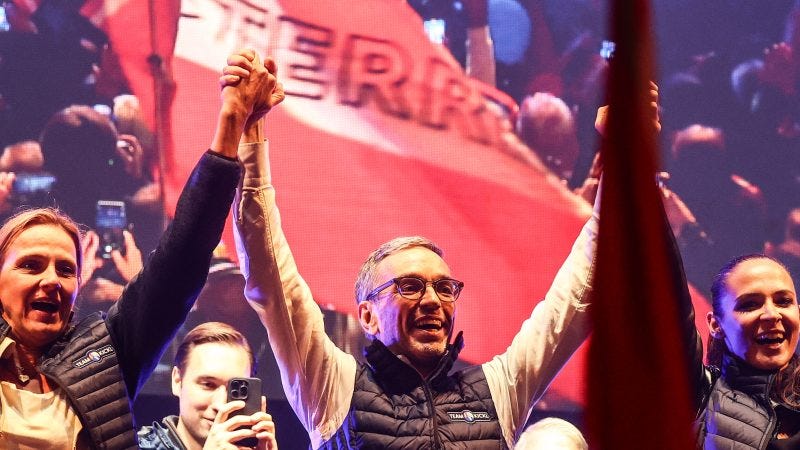Austria, The Latest Domino In Europe's Firewall Against The Far-Right
With nearly 30 percent of the national vote, the Freedom Party emerged in first place for the first time in the party's history. The repercussions of which will reverberate across the continent.
In Sunday’s national election, Austrian voters handed the Freedom Party of Austria a solid win, rebuking establishment parties and notching another victory for a nationalistic party in Europe as the tide of far-right populism rises on the continent.
For the first time since the party’s establishment in 1956, it came first in a national election, winning 28% of the vote share and nearly doubling its count from the last election. It was followed closely by the centre-right People’s Party at 26% and the centre-left Social Democratic Party, which trailed behind in a distant third place with 21%.
Even more remarkable is that this result came thanks to strong support among younger voters. Amid deep frustration with the cost of living and angst about immigration, the hard right clearly won among Austrians under 34 with 27% of that demographic, and even more decisively with the 35-to-59 set on 37%. The FPÖ profited as well from festering resentment over Austria’s strict measures during the Covid pandemic, which some saw as an erosion of their civil liberties. Gains amongst this demographic mirror similar trends across the continent - nationalist parties in France, the Netherlands, Belgium and Slovakia were delivered electoral wins largely in thanks to support from the youth.
This recent surge is not an isolated incident. It’s best to contextualise the FPO’s triumph within the surge of support for the far-right across Europe. In June, France’s far-right National Rally party scored more than 30 percent of the votes and came in first in European Union parliamentary elections, in a vote that prompted President Emmanuel Macron of France to call for a snap national vote. Last November, the Netherlands gave Geert Wilders’s far-right anti-Islam Party for Freedom a significant victory at ballot boxes, leading to a new government four months later.
Herbert Kickl, the pugilistic leader of the right-wing party, does not shy away from confrontational sabre-rattling. He has been on record for calling his political opponents “traitors” and has said he wants to put unfriendly journalists on “arrest lists.” He has demanded stopping all new asylum seekers to make Austria a “fortress of freedom,” including barring refugees from getting any social services and from obtaining Austrian citizenship. The World Health Organization, he has warned, is a dictatorship, seeking to erode Austria’s sovereignty. To the growing ranks of his supporters, he coolly diagnoses the country’s problems and offers reasonable solutions. To his detractors, the former interior minister is a dangerous right-wing extremist who trades in conspiracy theories.
Unsurprisingly, this inflammatory rhetoric has made Kickl something of a pariah in Austrian politics, isolating him from many of the potential coalition partners he will need to form an alliance with if he wishes to seek power. This is because Austria, like most European countries, has a multi-party parliamentary system, meaning not one single power can hold power alone.
The FPO’s natural partner, the centre-right OVP, seems hesitant to make any firm commitments. In the aftermath of the election results, Chancellor Karl Nehammer, leader of the conservative People’s Party, quickly made clear that he would stand by a campaign promise not to build a government which included Mr. Kickl in a large capacity.
Without government participation, this victory will merely be of great symbolic value. This does not mean, however, the FPO’s path is blocked indefinitely. Austria’s constitution grants the last word on nominations for ministers and the chancellor to the president. Despite President Alexander Van der Bellen making his dislike of Kickl vocal, it would be difficult for him to ignore the FPÖ’s strong showing.
On several occasions, Nehammer has stopped short of vowing not to work with the far-right party itself and may be open to working in an arrangement that limits Kickl’s role. If they wish to move from a protest group to a serious party, the FPO may have to learn to work within the system to exert their influence. Agreements must be struck and, with them, compromises. But with them come the chance to instill tangible policy changes.
That means the party has a fair chance of building an alliance with the center right, which may still work with the FPÖ if they field a different candidate for the top job. Like Wilders in the Netherlands, Kickl could perhaps serve in a more advisory role, shut out from the government but still steering it with his outside influence. Working in their benefit is the lack of any real alternatives.
Combined, the OVP and SPO do not have enough seats to govern in a stable majority, which means another smaller party will have to be included. The Greens, having governed in a coalition government with the OVP since 2019, will likely have no appetite joining another one after haemorrhaging half of their support. The only other possibility is a three-way coalition between the OVP, SPO and NEOS, a neoliberal party, an ideological dichotomy mirroring the incumbent German government.
But this is fraught with great risk, as Scholz can surely testify. Coalitions spanning large ideological divides as this are always vulnerable to paralysis as parties neglect compromise in favour of pushing their priorities. A three-way coalition could also backfire by strengthening the FPÖ’s anti-establishment image. Another five years in opposition, the thinking goes, could end up handing the party an even bigger win down the road.
And there is precedent for this. Le Pen’s national-populist National Rally in France has been steadily growing with each subsequent election, increasing from 18% in 2012 to 37% in the 2024 Parliamentary elections. Being shut out from power will only bolster the FPÖ’s rhetoric around ‘parties of the system’ and ‘coalition of losers’, again picking up dissatisfied voters and setting it on a course for growth,” he said.


